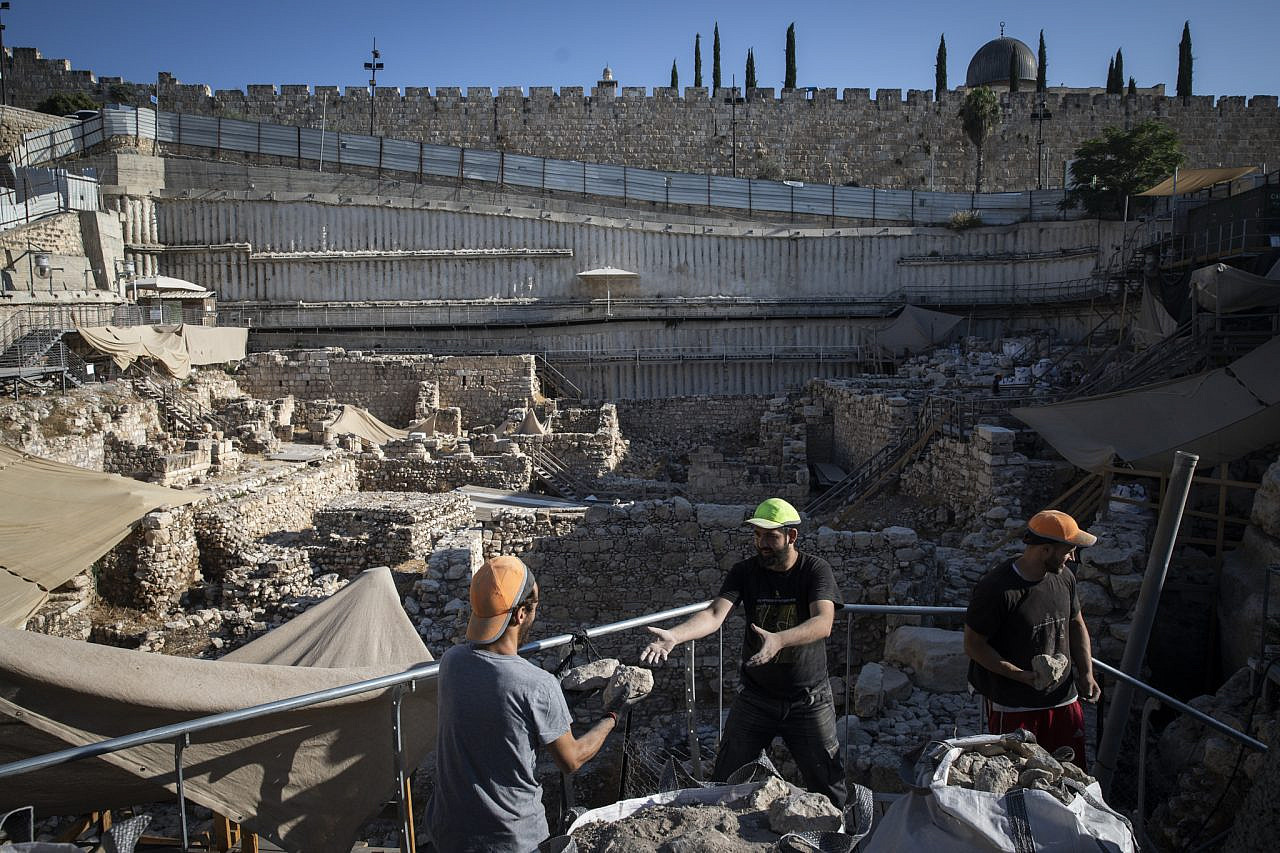Under cover of war, Israel is demolishing home after home in Silwan
 Sunday, September 8, 2024 at 06:14PM
Sunday, September 8, 2024 at 06:14PM https://www.972mag.com/silwan-home-demolitions-war-2024/
The government has accelerated plans to depopulate the East Jerusalem neighbourhood, displacing dozens of Palestinian residents this year.
By Jessica Buxbaum 6 September, 2024. 972 Magazine
Younes Odeh and his 3-year-old grandson stand atop the remains of a house in Silwan, a Palestinian neighborhood in the shadow of Jerusalem’s Old City. “This is where he slept,” Odeh says, pointing to a pile of broken drywall and crumbled concrete — all that’s left of his grandson’s bedroom.
On Aug. 27, Israeli bulldozers tore apart the house belonging to Odeh’s son, also named Younes, which he built adjacent to his father’s home in 2015. The same day, Israeli forces also demolished another home a few doors down.
Located in a section of Silwan known as Al-Bustan, the houses here have long been targeted for demolition over municipal plans to replace the residential area with an archaeological park. Negotiations between residents and the municipality to legalize building in the area and implement a zoning plan for Al-Bustan have largely forestalled the forcible displacement of the community, which numbers over 1,500 residents. Yet with international attention on Israel’s genocidal war in Gaza and the possibility of a broader regional escalation, residents believe the Israeli government has sensed an opportunity to push ahead with the demolitions.
“They’re using the war and the fact that all eyes are on national security to implement their own agenda in Jerusalem — which is displacement, increasing settlements, and transforming East Jerusalem from being majority Palestinian into Jewish-Israeli,” says Fakhri Abu Diab, chair of Al-Bustan’s residents’ committee, whose own home was demolished in February.
According to the Norwegian Refugee Council, Israel destroyed 128 Palestinian structures in East Jerusalem between Jan. 1 and Aug. 2 this year; 19 of these were in Al-Bustan, displacing 52 of the community’s residents. Meanwhile, since October 7, the Israeli government has approved or advanced the construction of thousands of housing units in Jewish settlements in East Jerusalem.
In early July, the Jerusalem Municipality and Israeli Border Police issued 16 demolition orders for homes in Al-Bustan, threatening more than 120 residents with homelessness. The notices warned residents that they had less than a month to vacate their homes — and sure enough, on Aug. 5, the authorities returned to demolish the home of Odeh’s cousin, Muhammad Abed Odeh. He, his spouse, and their five children are now crammed into his in-laws’ house. Meanwhile, Younes Odeh, his wife Shireen, and their two young children are currently living with his father while they search online for an affordable apartment.
One of the first items Younes grabbed before the demolition was his son’s Spiderman backpack. He should have been starting his first year of school this September, but his parents were forced to pull him out because they no longer know that they will be in the vicinity of the school. Now, Shireen says, her son wakes up at night drenched in urine, asking if the police are coming.
‘Settlement under the guise of tourism’
While all of East Jerusalem is coveted by the Israeli state and settler groups, Silwan’s proximity to the Old City makes it a higher priority for demolition. The Jerusalem Municipality has been eyeing Al-Bustan for nearly two decades, alleging that the community is built on the site where the revered Jewish monarch, King David, established his kingdom around 1,000 BCE.

The municipality issued its first demolition orders for buildings in Al-Bustan in 2005, as part of plans to transform the area into “The King’s Garden” archaeological park. Ir Amim, an Israeli NGO that monitors Israeli policy in Jerusalem, has described the proposal as “settlement under the guise of tourism.”
But the roots of the community’s housing crisis go deeper. After Israel occupied and illegally annexed East Jerusalem, it never approved zoning plans for most of the territory — including Al-Bustan, which the authorities instead designated as “green space.” Without such a plan, residents can’t obtain building permits, which are a necessary prerequisite for legal construction. As a result, all new construction, even on residents’ privately-owned land, is subject to demolition.
The municipality’s plans to raze the entire community to build a national park galvanized residents to push for a housing solution. International pressure, in addition to residents’ negotiations with the municipality, succeeded in securing a demolition freeze for Al-Bustan that has largely held since 2018.
But now, things are changing. The municipality rejected the residents’ zoning plan and began pressuring them to sign off on the municipality’s own proposal — developed without any local input. That plan reserves only 8 percent of the land for residential housing, while 85 percent is designated for “The King’s Garden.”

“Since October 7, the municipality has stopped negotiations,” Younes Odeh tells +972. “Before, there was a committee speaking with the municipality. Now, there is nothing.” And when there is any form of dialogue, it’s replete with hostility. “They talk to us like we are terrorists now,” Muhammad Abed Odeh says.
In a press release in early August, Ir Amim stated: “Demolitions of Palestinian homes have reached unparalleled levels since the outbreak of the war. Such practices constitute a form of collective punishment [and] retaliatory state violence.” The rights group also warned that the rate of demolitions may accelerate further after the Knesset transferred the Real Estate Enforcement Division, which carries out demolitions in East Jerusalem, from the Finance Ministry to the National Security Ministry, led by far-right lawmaker Itamar Ben Gvir.
As Al-Bustan faces this dire future — a threat to its very identity as a Palestinian community — the Odeh family already confronts their loss on a daily basis. “We see our house in front of us demolished while we live just next door,” Shireen Odeh says, surrounded by the furniture of her former home.
 APJP |
APJP |  Post a Comment |
Post a Comment | 

Reader Comments